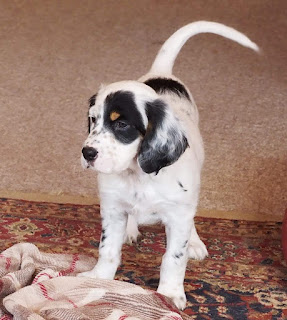I have four chain link kennels at the farm, the old Mason kind dating back to the 1970's. I have exercise yards, too. "Thunderdome" encircles the kennel building and runs; "Beyond Thunderdome" encloses my back yard off the utility room door.
When I cannot be with my dogs or cannot take them with me safely, they spend time there. When I am home, they are with me, either "free-ranging" or crated on the (extremely) rare occasion we have dog-nervous guests or tradespeople forever helping me cobble together this old farmhouse. That's how we roll.
The kennels on the hill were built by the former owner of this property. Bob generally had but one dog in the house at a time in the years that he was hunting four or five. He liked the focused one on one time, and each dog took a turn, day and night. But each dog had a kennel as well.
When the topic was broached, my friend would sternly say, "This is my house. My dogs visit. That is their house. I visit them there." That was the sense of order he believed in, and his setters, pointers, and Labradors were happy, well-adjusted, mannerly hunting, house, travel, and kennel dogs. No destruction or riotous nonsense in the house, no manic, nuisance barking in the kennels, calm and relaxed in the crates when we traveled.
As he got older and his crew slipped to fewer and fewer members, kennel time dwindled as well, until toward the end, the one or two dogs who shared his life spent not a minute in their assigned kennel runs. When his full-time shadow, a pointer named Cotton, became very ill, Bob was, too, and I handled that awful final vet visit. When I returned to the farm, Bob was rocking in his chair by the window. I sat in the black captain's chair nearby, both of us monstrously aware of the empty dog bed on the floor between us.
Without looking at me, he said, "Tonight will be the first time I will sleep in a house without a dog since I came home from the war." That was WWII...69 years before.
Within a week, he was asking me to research Labrador retrievers from imported British lines. After poring over pictures and pedigrees and long phone calls with breeders, I was dispatched to eastern Nebraska with an envelope full of cash. I made a rump-numbing, round-trip swing with pauses only for gas on the way out, puppy clean-out stops on the way back. That's how Quail Valley Boots Randolph came home to Ohio, the light of the last four years of Bob's life. Boots never saw the inside of his kennel while Bob was here.
A long time ago, an inveterate dog jockey of my acquaintance brought an English setter to me, asking for help. The guy was kind of a lurker on the fringes of the best grouse dog kennels in Michigan and a tony gun club in central Ohio, scooping up dogs that were free or available at a bargain rate because of some issue or another. When he brought Ghillie, his assessment of the anxious little white dog with a tan ear was, "He was simply too long in kennel pent." He left him as a boarder, promising to pay for his care and some basic training...and called a month later pleading poverty and trouble at home.
So Ghillie stayed. The man was right. Once he realized that time behind chain length was but a siesta, not a sentence, he relaxed, signed on to our team, and began flashing what his heavy-hitter pedigree said he was - a hard-going, biddable grouse hunting partner.
I have only two pieces of taxidermy from forty years of bird hunting. One is an Ohio grouse taken off a rocky strip mine contour, pinned for a very long time by a little white dog with one tan ear.
The bird dogs at Lynn Dee's home meld into a seamless routine of living that is a mix of dog bed, human bed, comfy couch, and occasional crate or kennel. In the coming weeks, Lynn Dee's pack will assimilate the newest family member, the swaggering spark plug of a puppy Pocket, kept from Dreamboat Annie's second litter.
Storm and Sally will insist Pocket minds her p's and q's, Flint and Kate will pretend she's not there, Seth will think she's interesting and want to play, and Annie will be glad she's not solely her responsibility any more.
But find her place, she will. After all, Firelights are bred for the fireside, marking time between autumn woods and fields.






This answers my question, "When will I become too old for a buddy?"
ReplyDelete